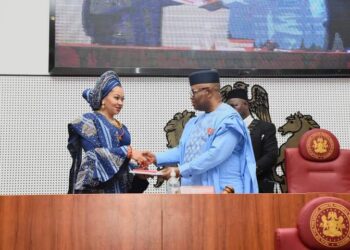Govs Abiodun Oyebanji (Ekiti); Dapo Abiodun (Ogun); Babajide Sanwo-Olu (Lagos); Seyi Makinde (Oyo); Lucky Aiydatiwa (Ondo) and Ademola Adeleke (Osun)
• Concerned groups cry for action, urge S’West govs to act now
By Lukman Olabiyi
In a heartfelt appeal, concerned groups and stakeholders have urgently called on governors in the South West to address the growing threat of the endangerment of the Yorùbá language.
The cry for action was articulated in a letter penned by a distinguished Professor of Linguistics, Kolá Owólabí, who chairs the Centre for Yorùbá Language Engineering (CEYOLENG). He is also Professor Emeritus, University of Ibadan (UI).
The letter, which reflected deep concerns, was signed by the leaders of 22 various groups and directed to Governor Babajide Sanwo-Olu of Lagos State, chairman, South West Governors’ Forum (SWGF), along with a copy sent to all other governors in the region.
The groups pointed to troubling trends they believe could jeopardise the future of Yorùbá, highlighting some critical issues.
According to them, literate speakers of the language are increasingly reluctant to use it, and it is only employed in a limited range of activities, further diminishing its prevalence in daily communication. Another worrying sign is the reluctance of parents to teach their children the language, a trend that is particularly noticeable among the youth, many of whom now favor the Europeanisation of their personal names.
***Prof. Owolabi told Daily Sun: “The europeanised names include, but not limited to; ….
“Furthermore, the elites, many of whom are from Yorùbá-speaking backgrounds have shown disdain for the language, believing it is inadequate for modern disciplines such as science, medicine, and engineering.”
The groups warned that these negative habits could contribute to the language’s eventual decline, “unless significant, timely action is taken.”
They also raised alarms over the lack of interest in studying Yorùbá in higher education institutions, with low enrollment numbers in colleges of education and universities in the 2020/2021 academic year.
Owolabi: “The trend is disturbing. We have all the facts and figures with us. Our governors in the South West need to do something urgent to halt this trend every academic year.
“CEYOLENG has written all the state Houses of Assembly. Only Osun State promised to invite us for further discussion on this. We are still waiting for that invitation.”
A recent survey by CEYOLENG revealed that fewer than 1,000 students across 32 colleges of education and 11 universities were enrolled in Yorùbá language courses, despite the fact that the Yorùbá-speaking population in Nigeria is estimated at around 50 million.
“That such a large population has so few students pursuing the study of their native language is a worrying sign of the lack of interest among youths in learning Yorùbá at the tertiary level.
The letter lamented: “Ironically, while the interest in Yorùbá language study is declining within Nigeria, it is gaining traction abroad. “Many foreign universities in the United States of America (USA), Brazil, Cuba and others are now offering courses in Yorùbá. They come to us on exchange programmes even from South Africa. And they are being sponsored by their governments. Why can’t our governments in South West do the same to our language?
“This trend underscores the paradox of a language cherished by non-Nigerians more than by its own speakers.”
The groups called on the South West governors to take immediate action, urging them to consider the establishment of a Yorùbá Language Board (YOLAB) in their states to lead efforts in revitalising and developing the language.
They also asked for support in funding Yorùbá terminology projects and creating policies that would enhance the use of the language, particularly in early childhood education and basic schooling.
The groups stressed the urgency of their message, imploring the governors to make concerted efforts to preserve Yorùbá for future generations.
Without swift intervention, they fear that Nigeria could face a situation “where foreign educators will be needed to teach the language to Yorùbá children in their own homeland.
“This call to action reflects the growing concern over the survival of Nigeria’s indigenous languages in the face of globalising forces that often prioritize more dominant tongues, and it serves as a reminder of the deep cultural value inherent in maintaining a rich linguistic heritage.”




 1 week ago
34
1 week ago
34







 English (US) ·
English (US) ·